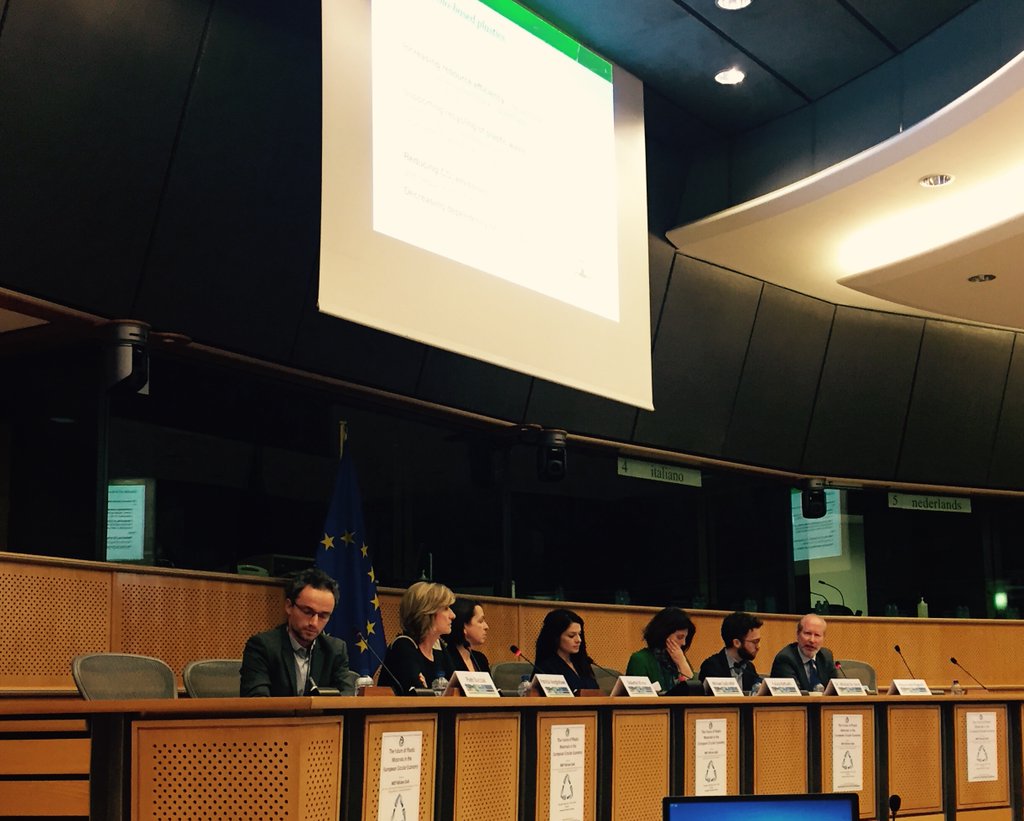On 7 April 2016, the European Parliament Intergroup on ‘Climate Change, Biodiversity and Sustainable Development’ invited a group of policy-makers and experts from regional authorities, NGOs and other stakeholders along the plastics value chain to discuss the challenges and opportunities of the role of plastics in the circular economy at a meeting entitled “The Future of Plastic Materials in the European Circular Economy”, hosted by MEP Miriam Dalli, Chair of the Circular Economy Working Group of the EP Intergroup. European Bioplastics’ Managing Director, Hasso von Pogrell, was also invited to the expert panel to provide insights on the crucial role of bioplastics in the transition towards a European circular economy and on how a supportive legislative framework is needed to foster the full environmental, social, and economic potential of bio-based products in Europe.
Photo: Speakers at the EP Intergroup meeting on April 7, 2016 (from left to right): Piotr Barczak, EEB; Patricia Vangheluwe, PlasticsEurope; Babette Winter, CoR; MEP Miriam Dalli; Michiel De Smet, DG GROW; Hasso von Pogrell, European Bioplastics.
MEP Dalli opened the meeting by stressing the importance and complexity of plastic materials in our society and how they revolutionised our daily lives. Yet, she also raised great concerns about the amount and end-of-life treatment of plastic waste, which causes great environmental impacts in streams, air, and oceans, the key solution to which is recycling and applying the principles of a circular economy.
Dalli stressed the need to accelerate better recycling targets and to push for biomaterials but said that all these measures must be supported by proper policies. Fulvia Raffaelli, Acting Head of Unit ‘Clean Technologies and Products’, DG GROW, European Commission added that incentivising recyclability in product design is key as is increasing separate collection of waste. The EU Circular Economy Package does address these demands by calling for increased recycling targets for plastic packaging waste and by outlining a landfill reduction target and putting a ban on landfilling separately collected waste.
Pogrell underlined that bioplastics play a key role in the transition to a circular economy by replacing fossil with renewable resources and increasing resource efficiency and by increasing recycling targets and waste management efficiency. The greater part of bio-based plastics can easily be recycled in existing recycling streams, and compostable plastics help increase separate collection of organic waste and divert biowaste from landfill and other waste streams.
Pogrell stressed that, in order for bioplastics to unfold their full economic and environmental potential in Europe, a supportive legislative framework is needed to enable and promote the market for bio-based products, to make separate collection of biowaste mandatory by 2020, and to include organic recycling in the definition of recycling.
Piotr Barczak, Policy Officer ‘Waste’ from the European Environmental Bureau, further called for standards for plastic recycling plants throughout Europe in order to improve the quality of the recycled materials. Only then can the EU market for secondary raw materials be strengthened – a market that bioplastics will strive in.
The full report of the meeting can be found here.
